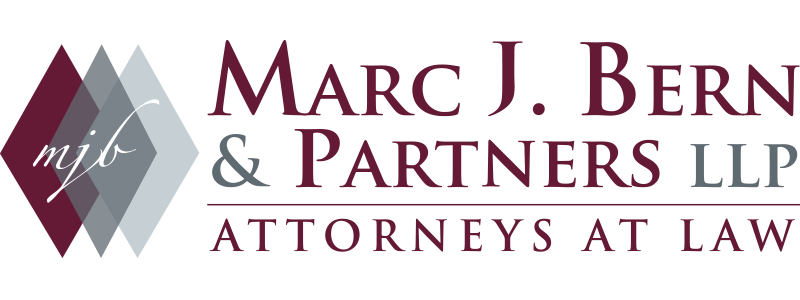Employment Law (California)
 Wage & Hour Claims
Wage & Hour Claims
The attorneys at Marc J. Bern & Partners fight to ensure that all employees are paid for what they earned. We represent California workers whose employers have violated federal, state, or local laws governing minimum wage, overtime, misclassification, exemptions, tips, commissions, prevailing wages, and other compensation. If your employer has done any of the following, please contact Marc J. Bern & Partners immediately:
- Failed to pay you overtime
- Paid you a salary when they should have paid you by the hour – misclassified you as an “exempt” employee when you should have been “non-exempt”
- Prevented you from taking an uninterrupted 30-minute meal break or any of your 10-minute rest breaks – or required you to perform job duties during your meal or rest break
- Paid you a piece-rate but failed to pay you for overtime rest breaks, or minimum wage for down time.
- Failed to pay you for all the hours you worked
- Failed to provide you with a pay stub or wage statement with all of the required components
- Paid you less than minimum wage
- Failed to reimburse you for work related expenses
- Failed to pay you for all hours worked upon your termination or layoff
For a free case evaluation or to learn your rights regarding Wage & Hour Claims, please contact Attorney Dale Ratner.
Discrimination & Harassment Claims
The attorneys at Marc J. Bern & Partners represent California employees who have suffered discrimination and/or harassment in the workplace.
If you are an employee who has experienced discrimination or harassment in the workplace, you know how painful and career-altering such conduct can be. Generally, discrimination means less favorable treatment because of a bias against someone based on age, gender/gender identity, sexual orientation, disability, national origin, and/or religion. Discrimination takes many forms and can negatively affect your hiring, conditions of employment, compensation, prospects for promotion, and could even get you fired.
California law prohibits companies from taking any adverse employment action against an employee because of the characteristics listed below. An “adverse action” can be termination, demotion, a cut in pay, or an undesirable transfer.
- Race
- Religion
- Color
- Age (if 40 or over)
- National origin
- Ancestry
- Physical or mental disability
- Medical condition
- Marital status
- Gender
- Sex
- Sexual orientation
- Pregnancy, childbirth or related medical conditions of any female employee
In addition to the above, there are also incidents of “reverse discrimination” when a member of a majority protected class (Caucasians, Christians) are discriminated against simply because they are a member of the protected class.
The law also prohibits discrimination based on the perception of protected characteristics (the perception that the aggrieved individual has one of the above protected characteristics, even if he or she in fact does not). Additionally, an employer may not take an adverse action based upon a person’s association with another person (e.g., spouse) who has or is perceived to have one of the above protected characteristics. If you believe your company has terminated you, skipped your promotion, or demoted you because of one of the above characteristics, call our firm immediately.
Harassment involves conduct by an employer, supervisor or co-worker that includes unwelcome advances or other conduct that is offensive, intimidating, or abusive. Like discrimination, harassment in the workplace can take many forms, and can dramatically harm your relationship with the employer, your opportunities for success at your job, and your emotional and physical well-being.
For a free case evaluation or to learn your rights regarding Discrimination & Harassment Claims, please contact Attorney Dale Ratner.
Retaliation Claims
In addition to protecting against discriminatory acts, federal, state, and local laws also prohibit an employer from retaliating against employees who complain of acts of discrimination, harassment, overtime pay violations or other workplace laws. Protection against retaliation extends further than many realize. It may seem common sense that an employer cannot fire an employee for filing a lawsuit. But many are not aware that the legal protection of employees extends much further. In fact, any good faith complaint of unlawful employment practices, such as harassment, discrimination, failure to provide accommodations for a disability, or failure to provide overtime, is considered protected. This includes internal complaints made directly to an employer or the company’s HR department. Complaining to an external state or federal agency, such as the Department of Labor or the EEOC, is also conduct that is protected from retaliation. Please call our wrongful termination lawyers to discuss your potential retaliation claim.
For a free case evaluation or to learn your rights regarding Retaliation Claims, please contact Attorney Dale Ratner.
PAGA Claims
California allows employees to bring lawsuits against their employers for violations of California’s Labor Code under the Private Attorney General’s Act (“PAGA.”) PAGA allows employees to protect their rights when California’s Labor and Workforce Development Agency declines to bring a suit or investigation over potential Labor Code violations. If you are an employee in California, you can bring a claim for yourself and all current and former co-workers on PAGA. The PAGA claim can be for any violation of California’s Labor Code. By bringing a PAGA claim, you are protecting your rights and safety and the rights and safety of your co-workers.
Employees wishing to bring a PAGA claim must first file an on-line notice with California’s Labor and Workforce Development Agency. This notice must contain citations to specific Labor Code sections that have been violated as well as facts that support the accusation that your employer violated California’s Labor Code. At Marc J. Bern & Partners, experienced attorneys and staff will be able to assist with the drafting of these petitions so they survive scrutiny. A copy of the notice must also be sent to your employer. The Labor and Workforce Development Agency then can choose whether to bring an investigation or not. If the agency declines to investigate the violations, you have the right to pursue the action in court. Most PAGA claims are heard in state court.
If you are successful in proving that your employer violated California’s Labor Code under PAGA, the civil penalty is shared with the State of California. 75 percent of the penalty goes to California. Employees receive 25 percent of the penalty issued by the court or of the settlement between the employee and employer.
For a free case evaluation or to learn your rights regarding PAGA Claims, please contact Attorney Dale Ratner.

